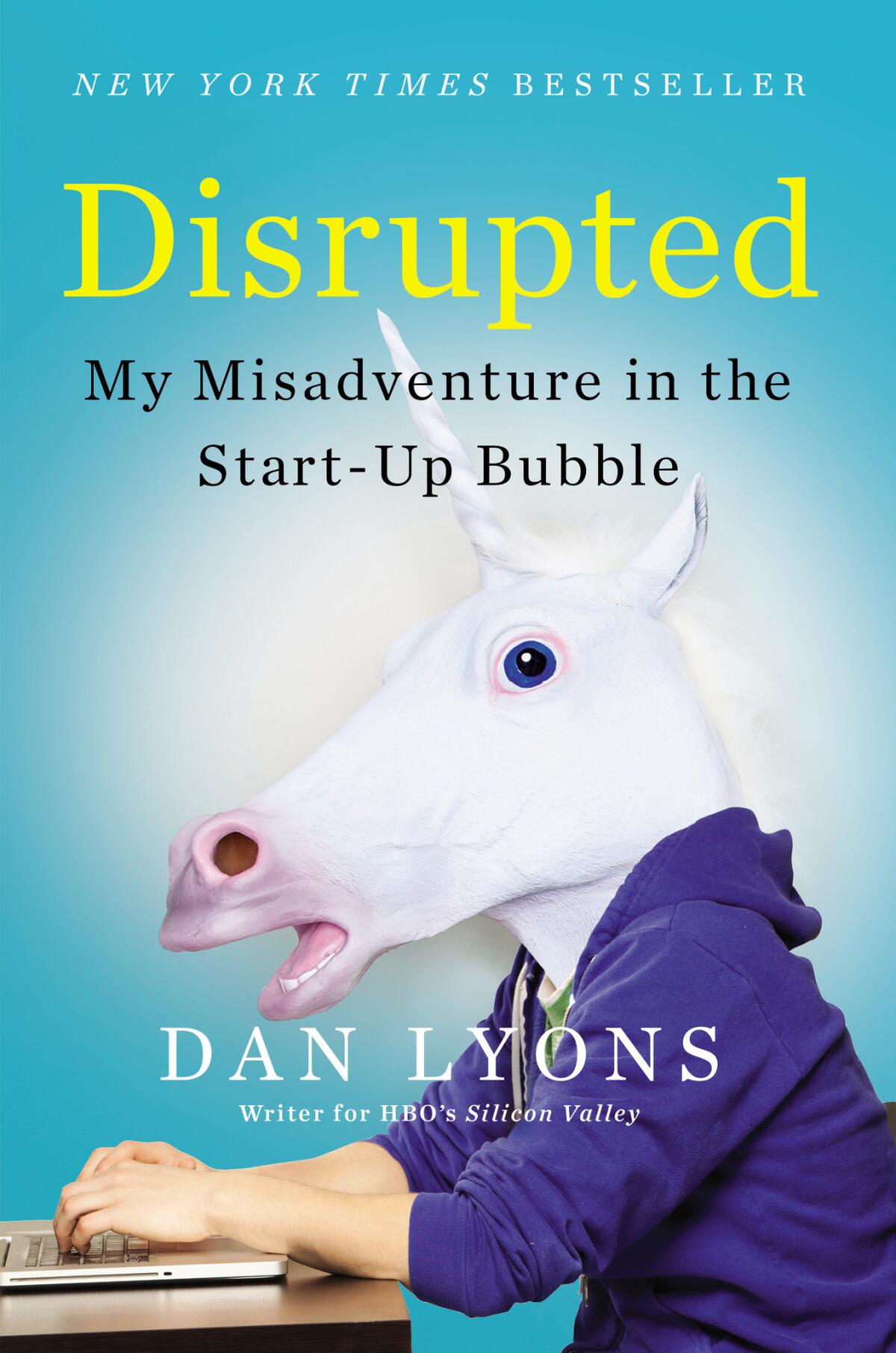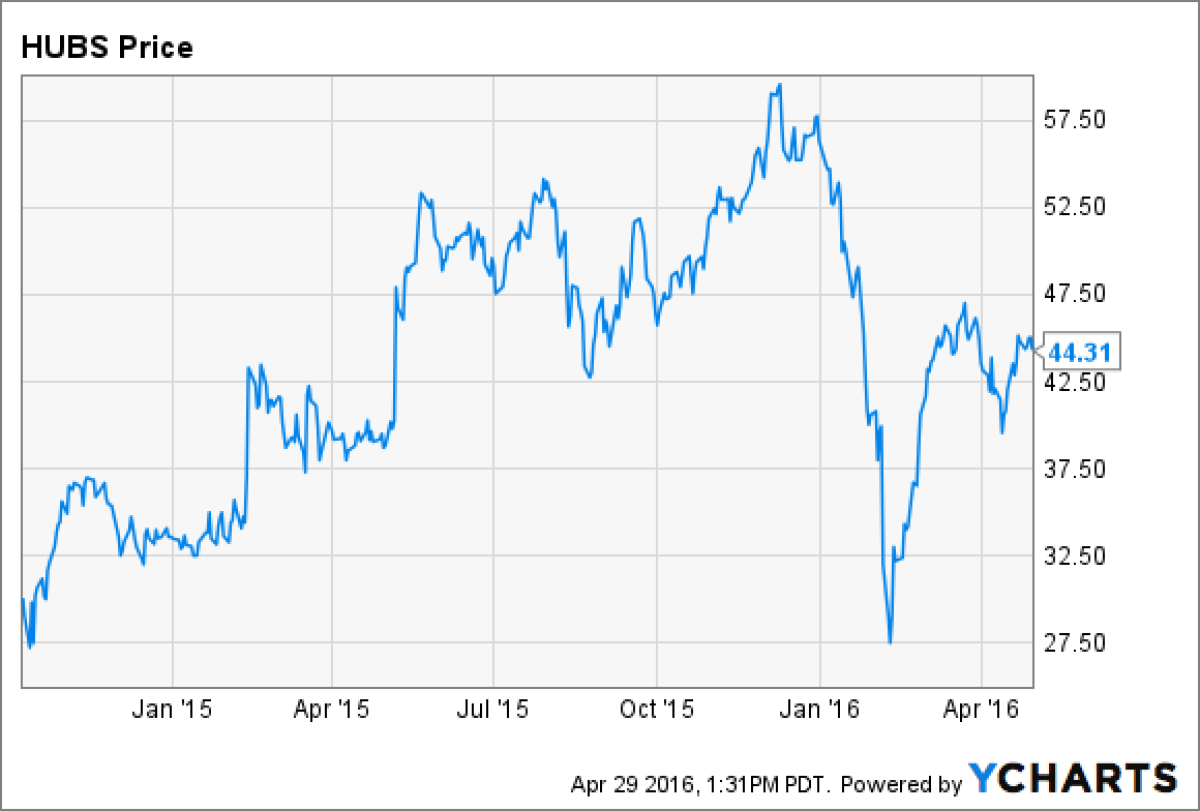‘Disrupted’ by Dan Lyons is the best book about Silicon Valley today. We talk to the author.
Dan Lyons was the 51-year-old technology editor at Newsweek in the summer of 2012, planning a European vacation with his wife and six-year-old twins, when he was abruptly informed by phone that his job was being eliminated. He had two weeks to pack up, no severance. About a year later, he found himself being shown around as the new marketing fellow at a Cambridge, Mass., software marketing firm called HubSpot, where his colleagues were, on average, half his age.
The product of his 20 months at HubSpot is "Disrupted: My misadventure in the Start-Up Bubble." It's the best book about the Silicon Valley state of mind as it's playing out today, in what may well be the second tech bubble of our time. Simultaneously hilarious and terrifying, "Disrupted" is an insider's look at a technology start-up from an outsider's perspective. Yet it's more than a chronicle of Lyons' tenure at one company, but a broader commentary on a business culture that often appears to be built on financial quicksand.
Maybe Hubspot is an extreme example onthe culture front, but it's not an outlier.
— "Disrupted" author Dan Lyons
According to Lyons' description, the working environment at HubSpot is almost a caricature of a Silicon Valley start-up. Most of its workers are fresh out of college. They're energized by an almost cult-like atmosphere instilled by its founders, Brian Halligan and Dharmesh Shah, and plied with group outings and free beer and candy, foosball and ping-pong tables, and massages. Lyons asks what the point is of all this activity. "Where others saw a fun place to work," he writes, "I saw a place where 'old people' -- those over 40 and certainly over 50 -- were largely unwanted. ... I saw poorly trained managers, haphazard oversight and an organization that was out of control."
Though Lyons' experience leads the reader to doubt HubSpot's staying power, the company staged a successful public offering in October 2014 and is currently valued at $1.5 billion. It has never turned a profit.
Lyons, who left about a month after the IPO, was a veteran of technology reporting when he joined HubSpot. He had been a technology writer at Forbes when he launched the Fake Steve Jobs blog pseudonymously in 2006, commenting on Apple and tech industry developments in the voice of a Jobs-like character. He's been a pointed critic of Silicon Valley companies and ethics, including one 2012 episode in which he fomented a memorable verbal firefight by questioning the ethics of venture investors, PR gurus and tech journalists in what he termed the "Silicon Cesspool." We weighed in on the controversy here. Lyons also wrote for Seasons 2 and 3 of the HBO comedy "Silicon Valley," though he recently learned he's been dropped from the roster for the upcoming fourth season.
The Q&A below is an edited version of the conversation we had with Lyons by phone earlier this week.
==========
Michael Hiltzik: In "Disrupted," you tell the story of one guy working at one tech company where the workplace seems like a frat house or even a preschool. What sort of reactions have you gotten from others who worked in the same sort of environment?

Dan Lyons: I've been surprised at the response. A lot of people who feel they aged out of the workplace too early are writing me, and that really struck a nerve. I wasn't aware how big a phenomenon that is -- I think it's bigger than any of us know, because people just don't talk about it. I also get a lot of emails from people saying, I did the same thing, I went and worked in some start-up, some kindergarten kind of place. It was just out of control and I thought it was just me, I thought it was crazy and I left after five months. I feel glad the book connects with people, but I had no idea there were that many people having those experiences.
Hiltzik: Your book describes HubSpot as a firm offering mediocre products, that spends lavishly and has little effective management. Given that it had a successful initial public offering in 2014, after reading the book I almost felt like going out and selling every mutual fund I owned with any exposure to Nasdaq stocks at all. Am I wrong? How widespread do you think these characteristics are?
Lyons: I think they're very widespread. Maybe Hubspot is an extreme example on the culture front, but it's not an outlier. There are a lot of companies like that. The HubSpot guys said something in response to the book about how, "We're trading growth for profitability." [Ed. note: The quote is from co-founder Dharmesh Shah, who wrote on LinkedIn: "There’s usually a tradeoff between growth and profitability."] They're 10 years old! Your business can't grow into making money after 10 years?
There's been this delusion that it's OK, companies don't need to make money, they just need to grow, either to build an audience or build revenues, and don't worry, the profits will come someday. In terms of the culture I think that's why the book resonated with so many people. The superficial stuff is the foosball tables in the office and the free beers and snacks, but there's this deeper level of just poor management, of companies that don't have any structure. And I see big companies building incubators trying to emulate this -- they're not appalled by it, they're somehow envious of it.
Hiltzik: But as long as venture investors are willing to fund it, who's hurt?

Lyons: These companies are squeezing into the public markets. All that risk is being shifted onto public investors, and I don't know if they're aware of it. I hope the world's going to return to the old kind of model, in which if you want my money as an investor, you have to prove that this thing works. Instead, you're asking me to take all this risk, and at very high prices, and you can't demonstrate that this will ever be a profitable business. Some tech companies like Google and Facebook have this share structure where you're a shareholder and you don't even have a voice in the company. [Ed. note: We wrote about this earlier this week.] I think these deals are rigged to benefit the insiders, the venture capitalists and the founders and early employees. They're flooding this stuff into the public markets, and people are buying it.
Hiltzik: Back in the 1990s, I spent some time with a group of early-stage venture investors who called themselves the Band of Angels. Many were retired engineering executives from companies like Intel; they would meet every month and hear pitches from a dozen companies, and really grill them hard before deciding whether to invest. Reading your book, one wonders how many of today's tech "unicorns" with billion-dollar valuations could survive that process.
Lyons: The model you're describing has flipped upside down. The angel investors used to be a filter you had to get through. There would be 50 start-ups and two were going to get funded, and they were competing for that scarce money. Now there's billions of dollars chasing a handful of companies, and venture capitalists are competing with each other to give people their money. A company with any kind of buzz can pick and choose whose money they want to take. It's supply and demand, right? There are only so many good ideas and all this money is chasing them, and the VCs all pile into the same handful of companies and drive the valuations ridiculously high.
Hiltzik: One thing you touched on only a bit in the book but have written about elsewhere is the complicity of the tech press in promoting some of these companies. How big an issue do you think that is?

Lyons: The tech press in the 1980s, say before the Internet, was more adversarial and more critical. There were more people covering tech and more real journalists. But that relationship has become about getting access. The tech coverage has gotten very cozy, and the press gets swept up in the enthusiasm. Companies in Silicon Valley have become very good at cultivating one or two journalists who are friendly to them. Those journalists see their page view numbers go up because they have great access to Facebook, say, and they're always getting the scoops. They get rewarded internally because their traffic numbers are great, so they become almost like a PR person for the company. I think that's the danger of journalists getting rewarded for clicks.
People who cover Apple figured this racket out a long time ago, which is that if you become cozy with Apple and never criticize them, they will give you some access.
Hiltzik: One question your book inspires is how much about Silicon Valley is really different today from the past. At one point in "Disrupted" you quote Gene Kleiner, who was one of the pioneering venture investors in the valley, saying that "even turkeys can fly." Yet there seemed to be fewer turkeys in the old days.
Lyons: I heard a long-time investor talk about exactly this. At one point it was about building a better mousetrap. You competed on technology. But technology isn't what it's really about anymore. It's about business models. Also, a lot of these companies aren't really even tech companies--a lot of them are media companies, so that makes a big difference. When VCs were basically engineers, they could scrutinize technology. But I think there was a disconnect when things stopped being about technology and became more about media or fads. But then a new kind of VC emerged. They're really about financial engineering, not product engineering, and you have companies that are more like financial vehicles. I don't think there's any intent from the start to make a sustainable business that's going to run for a long time.
Back in the day, were Kleiner and Perkins that cynical? [VC Tom Perkins, former partner of Kleiner's.] Were they thinking, we can just flog a piece of garbage into the world and we'll make money? Maybe they were, and I was naive to think that they weren't. Sevin Rosen, when they were building Compaq, I don't think they were thinking, wow, we'll make a quick buck and scoot out, these computers aren't any good. I think they were trying to find good technology and invest in it. [L.J. Sevin and Benjamin Rosen founded Sevin Rosen Funds, which provided early financing for Compaq Computer Corp.]
Hiltzik: The ageism of Silicon Valley--in fact, the general lack of diversity in many of these companies--is a thread that runs through your book almost from first page to last; your colleagues are mostly white, newly minted college graduates. There's a scene you call your "Norma Rae moment," when you try to lecture your young colleagues that they're being bought off cheaply by the superficial perks at HubSpot. "My generation would never have fallen for free candy," you tell them. "We wanted to get paid in actual money." And you get blank looks. That points to the question of what these companies may be missing by employing such a homogeneous workforce--and what the workers may be missing by not having more experienced colleagues around or those from diverse social backgrounds.
Lyons: I always worked in places where there were people of all ages, and I took it for granted that that's how the world was. Only when I was at a place where everyone was of one age did I realize that not every place is like that. I've come to believe that that diversity across age, race, gender, is a virtue in and of itself. It makes the organization better. At the newspapers and magazines where I worked right out of college, there were guys on the verge of retiring. We worked side by side and we all benefited from that. Especially across the vector of age, there's just tremendous value to an organization to have people at all stages of their career for mentorship, to carry things along.
Millennials are getting hoodwinked (by free candy and other perks).Working with older people might raise awareness that some of this is rubbish. I don't know if ageism will ever get better in Silicon Valley. They don't even pay lip service to age, they just say, we want young people. I think they would be better companies if they had young and old people. But I don't think they believe that.
Keep up to date with Michael Hiltzik. Follow @hiltzikm on Twitter, see his Facebook page, or email michael.hiltzik@latimes.com.
Sign up for our Book Club newsletter
Get the latest news, events and more from the Los Angeles Times Book Club, and help us get L.A. reading and talking.
You may occasionally receive promotional content from the Los Angeles Times.




